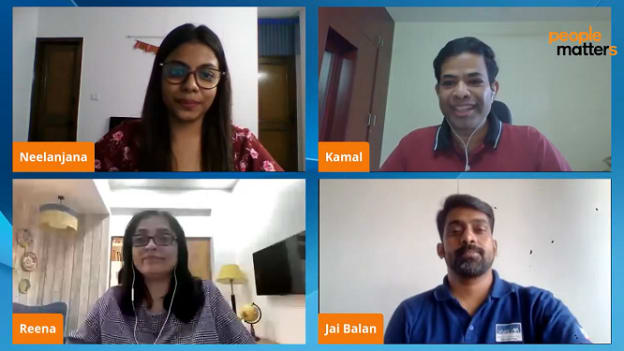Crossing the Rubicon for BFSI talent: technologists as the dominant force

The new normal has marked the end of the Fintech experimentation driven by technology. With the onset of the pandemic, the BFSI workforce was asked to engage differently, to respond to the new shifts in customer demand. In the past a great BFSI business was about automating, today it is about “adding smartness” to interfaces and experiences. As Bhaskaran S, Chief Academic officer, Unext Learning Pvt. Ltd puts it, “Going ahead, even a microprocessor will become an AI engine, taking decisions on the behalf of humans”. Bill Gates earlier quoted, “Banking is necessary, banks are not”. This will be the business milieu of tomorrow and enterprises will need to transform from a FinServe DNA to a TechFin DNA, serving every question such as the when, where and how’s of the world.
Skill development for a TechFin landscape
Such a TechFin landscape demands new skills. Advanced IT, complex information processing, advanced data analysis and mathematical skills are the need of tomorrow. The tech-led BFSI organization should develop such a workforce:
- The tech base: Engineers, data engineers, analytics engineers, visualization engineers etc.
- The SME layer of managers
- The architects top-up (Product architect, software architect, data scientist, AI architect) with deep expertise in specific domains, combined with project exposure (IT group head, product manager, program manager, project manager etc.).
These emerging roles in BFSI are changing how technology is assimilated in every banking role. The way to fulfil these roles is to “train on banking, hire on technology” as below:
- Train on banking: Enable the front line staff to use tech in their day to day work. Help senior grades understand the power of emerging technologies such as AI, Big data, cloud computing etc.
- Hire on technology: The half-life of emerging technologies is just a few months due to rapid changes in the technology industry, hence certain skills must be bought from outside. As Kamal Das, Head Data Science and Partner Program, Jigsaw Academy outlines, 70% of all loans disbursed to retail clients are done based on ML. 70% of credit card sourcing is based on AI and deep learning algorithms. Hence the need to hire fast and hire right.
Overarching the technology and business skills, lie the soft skills. According to a McKinsey survey, companies are increasingly focusing on developing social, emotional and advanced cognitive skills. Many people think that technology will replace humans, the reality is that technology is nowhere close to human capability and organizations must leverage technology to supplement human skills better. Reena Tyagi, Chief HR Officer @ Manipal Signa Health Insurance, mentions the importance of human skills such as resilience, ability to maintain emotional wellbeing, agility, ability to adapt and respond to change, empathy, and trust. These times have proven the importance of the emotional quotient and human connect, and leaders must strive to build and develop these humane skills.
Reshaping the workforce for the changing world of work
Merely getting the right skills and talent in place is not enough. As BFSI companies move towards platforms and super-apps, their brand identity has changed. Leaders need to invest in the softer side by defining an HR strategy around cultural tenets such as below:
Wellness & wellbeing: Reena Tyagi shares her experience around curating organizational culture. “Our EVP always said ‘we care’, and this became very pertinent post Covid. Safety net was seen to be one of the most important propositions so we moved to virtual wellness programs, free doctor consultations, employee assistance programs, counselling services, employee and family vaccinations, health committee and other wellness related services support for our people”. These will become high priority items for an organizational strategy going ahead.
Work life integration and support: Work pressures increased due to work from home and due to insurance-consumers increased demands: Leadership had to start leading from the front, communicating and including people in all decisions. As Jai Balan says, “The key pillar became trust, when managers started saying things like “I don’t care where you work from as long as work gets done”. Trust as a tenet was tested to the core, as managers were forced to measure people based on outcomes, rather than on time spent at work. Reena talks about how Covid leaves were received well by leaders and employees alike, because digital fatigue was leading to burnout. Jai believes that leaders must realise that what matters is the appreciation of what is going on in someone else’s life. Bharti Axa Life Insurance took steps towards supporting families of employees who passed away by offering them job opportunities through reskilling. Another well-applauded policy was to give everyone half day off monthly, no questions asked. Compassion, emotional maturity and empathy must be at the core of the employee experience.
Digitalization: Due to rampant uncertainty, organizational efficiency and cost management became important. The BFSI sector fundamentals have changed. Balan says, “Today, people don’t want a 40-page paper-policy, they want a simple chatbot or call to deliver an Amazon-like experience. With the likes of Paytm and policy bazaar, technology is the front-face for the customer and customers are spoilt for choice. Mindsets too have changed, for example, people may want to invest money rather than buy insurance”. To cater to this new reality, incremental change is no longer sufficient. Speedy and smooth process improvement experiences are what tech should deliver on. In the past year organizations have rapidly turned to digital transformation to lead from the front for a digital employee experience. Reena shares, “As BFSI companies are investing in AI-ML, there is increased focus on using data-led apps.” Jai elaborates on how the entire HRMS system was made available on an app so that employees need not be dependent on coming in office.
TechFin is a change management agenda
Bringing onboard new competencies is one aspect, but more important is fundamentally changing the organizational culture to thrive through change. Leaders cannot just plug in technology, they need to embed tech in the DNA. This means holistic moves towards creating a less hierarchical structure, less rigid internal policies, and cultivating a sense of IT community. In BFSI, a post-crisis regulatory framework is giving rise to new business models. Disruption is rampant and those who cannot adapt are left behind.
As Jai Balan, Head HR, Bharti Axa Life Insurance, puts it, “Fintech by nature, is about delivering financial services with tech at its core. Tech precedence has always been around, but people still form the core”. As organizations grapple with new ways of working such as hybrid, leaders must demonstrate the right ethos and behaviours. Trust, transparency and inclusivity are the core values to help people live the desired values and outperform every day. Leaders must accordingly think, act, and strategies the employee experience.
You can also watch the session here.













